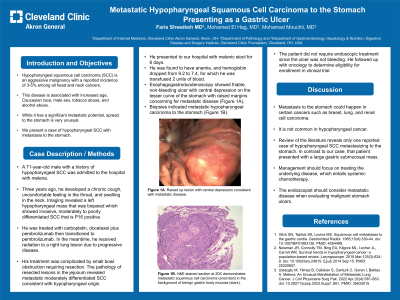Sunday Poster Session
Category: Stomach
P1353 - Metastatic Hypopharyngeal Squamous Cell Carcinoma to the Stomach Presenting as a Gastric Ulcer
Sunday, October 22, 2023
3:30 PM - 7:00 PM PT
Location: Exhibit Hall

Has Audio
- FS
Faris Shweikeh, MD
Cleveland Clinic Akron General
Akron, Ohio
Presenting Author(s)
Faris Shweikeh, MD1, Mohamed El Hag, MD2, Mohamad Mouchli, MD2
1Cleveland Clinic Akron General, Akron, OH; 2Cleveland Clinic, Cleveland, OH
Introduction: Hypopharyngeal squamous cell carcinoma (SCC) is an aggressive malignancy with a reported incidence of 3-5% among all head and neck cancers. This disease is associated with increased age, Caucasian race, male sex, tobacco abuse, and alcohol abuse. While it has a significant metastatic potential, spread to the stomach is very unusual. We present a case of hypopharyngeal SCC with metastasis to the stomach.
Case Description/Methods: A 71-year-old male with a history of hypopharyngeal SCC was admitted to the hospital with melena. Three years ago, he developed a chronic cough, uncomfortable feeling in the throat, and swelling in the neck. Imaging revealed a left hypopharyngeal mass that was biopsied which showed invasive, moderately to poorly differentiated SCC that is P16 positive. He was treated with carboplatin, docetaxel plus pembrolizumab then transitioned to pembrolizumab. In the meantime, he received radiation to a right lung lesion due to progressive disease. His treatment was complicated by small bowl obstruction requiring resection. The pathology of resected lesions in the jejunum revealed metastatic moderately differentiated SCC consistent with hypopharyngeal origin.
He presented to our hospital with melenic stool for 6 days. He was found to have anemia, and hemoglobin dropped from 9.2 to 7.4, for which he was transfused 2 units of blood. Esophagogastroduodenoscopy showed friable, non-bleeding ulcer with central depression on the lesser curve of the stomach with raised margins concerning for metastatic disease (Figure 1A). Biopsies indicated metastatic hypopharyngeal carcinoma to the stomach (Figure 1B). The patient did not require endoscopic treatment since the ulcer was not bleeding. He followed up with oncology to determine eligibility for enrollment in clinical trial.
Discussion: Metastasis to the stomach could happen in certain cancers such as breast, lung, and renal cell carcinoma. It is not common in hypopharyngeal cancer. Review of the literature reveals only one reported case of hypopharyngeal SCC metastasizing to the stomach. In contrast to our case, that patient presented with a large gastric submucosal mass. Management should focus on treating the underlying disease, which entails systemic chemotherapy. The endoscopist should consider metastatic disease when evaluating malignant stomach ulcers.

Disclosures:
Faris Shweikeh, MD1, Mohamed El Hag, MD2, Mohamad Mouchli, MD2. P1353 - Metastatic Hypopharyngeal Squamous Cell Carcinoma to the Stomach Presenting as a Gastric Ulcer, ACG 2023 Annual Scientific Meeting Abstracts. Vancouver, BC, Canada: American College of Gastroenterology.
1Cleveland Clinic Akron General, Akron, OH; 2Cleveland Clinic, Cleveland, OH
Introduction: Hypopharyngeal squamous cell carcinoma (SCC) is an aggressive malignancy with a reported incidence of 3-5% among all head and neck cancers. This disease is associated with increased age, Caucasian race, male sex, tobacco abuse, and alcohol abuse. While it has a significant metastatic potential, spread to the stomach is very unusual. We present a case of hypopharyngeal SCC with metastasis to the stomach.
Case Description/Methods: A 71-year-old male with a history of hypopharyngeal SCC was admitted to the hospital with melena. Three years ago, he developed a chronic cough, uncomfortable feeling in the throat, and swelling in the neck. Imaging revealed a left hypopharyngeal mass that was biopsied which showed invasive, moderately to poorly differentiated SCC that is P16 positive. He was treated with carboplatin, docetaxel plus pembrolizumab then transitioned to pembrolizumab. In the meantime, he received radiation to a right lung lesion due to progressive disease. His treatment was complicated by small bowl obstruction requiring resection. The pathology of resected lesions in the jejunum revealed metastatic moderately differentiated SCC consistent with hypopharyngeal origin.
He presented to our hospital with melenic stool for 6 days. He was found to have anemia, and hemoglobin dropped from 9.2 to 7.4, for which he was transfused 2 units of blood. Esophagogastroduodenoscopy showed friable, non-bleeding ulcer with central depression on the lesser curve of the stomach with raised margins concerning for metastatic disease (Figure 1A). Biopsies indicated metastatic hypopharyngeal carcinoma to the stomach (Figure 1B). The patient did not require endoscopic treatment since the ulcer was not bleeding. He followed up with oncology to determine eligibility for enrollment in clinical trial.
Discussion: Metastasis to the stomach could happen in certain cancers such as breast, lung, and renal cell carcinoma. It is not common in hypopharyngeal cancer. Review of the literature reveals only one reported case of hypopharyngeal SCC metastasizing to the stomach. In contrast to our case, that patient presented with a large gastric submucosal mass. Management should focus on treating the underlying disease, which entails systemic chemotherapy. The endoscopist should consider metastatic disease when evaluating malignant stomach ulcers.

Figure: Figure 1A. Raised up lesion with central depression consistent with metastatic disease. Figure 1B. H&E stained section at 20X demonstrates metastatic squamous cell carcinoma (encircled) in the background of benign gastric body mucosa (stars).
Disclosures:
Faris Shweikeh indicated no relevant financial relationships.
Mohamed El Hag indicated no relevant financial relationships.
Mohamad Mouchli indicated no relevant financial relationships.
Faris Shweikeh, MD1, Mohamed El Hag, MD2, Mohamad Mouchli, MD2. P1353 - Metastatic Hypopharyngeal Squamous Cell Carcinoma to the Stomach Presenting as a Gastric Ulcer, ACG 2023 Annual Scientific Meeting Abstracts. Vancouver, BC, Canada: American College of Gastroenterology.
